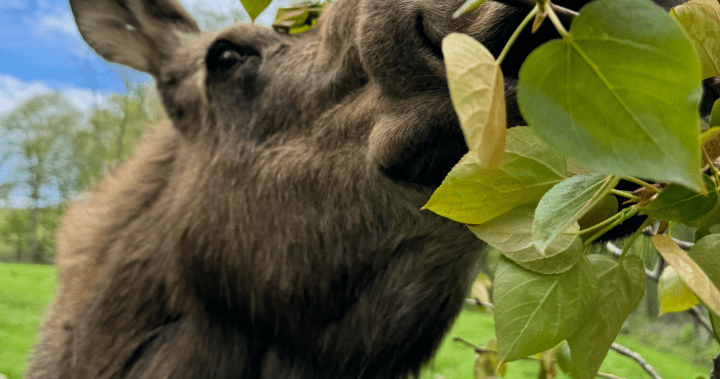The Toronto Zoo recently announced that one of its two moose, Trilly, had to be euthanized after experiencing a decline in health due to old age. Trilly, who was 11 years old, surpassed the average life expectancy of a moose in human care. Despite efforts to increase her feed intake, she had lost a lot of condition and had various arthritic changes in multiple limbs. Trilly also suffered from significant arthritis, including a ruptured tendon on her left hock, leading to joint instability and further arthritis. The Zoo stated that moose are notoriously difficult to feed in their old age, but Trilly fared better than most other moose in a similar environment.
The Zoo reported that recent x-rays revealed arthritis in at least three out of four pasterns, as well as changes to one of her pedal bones related to a hoof abscess. Trilly was described as keeping Wildlife Care staff on their toes by showing off her “Grumpy ears” if she didn’t get what she wanted. Additionally, she was very protective of her sister, Lilly. The Toronto Zoo, home to more than 3,000 animals representing over 250 species, acknowledged that experiencing losses like Trilly is a natural part of caring for animals in a zoo setting.
Ultimately, Trilly’s decline in health and challenges with arthritis led to the difficult decision to euthanize her. Despite receiving extensive care and efforts to improve her feed intake, her condition continued to deteriorate. The Toronto Zoo recognized Trilly’s resilience and praised her for surpassing the average life expectancy for moose in captivity. Trilly’s passing serves as a reminder of the complexities and challenges involved in caring for aging animals, especially those with chronic health issues like arthritis.
The loss of Trilly has undoubtedly impacted the Wildlife Care staff at the Toronto Zoo, who worked tirelessly to provide her with the best possible care throughout her life. Trilly’s passing highlights the emotional toll that caring for animals can take on zookeepers and staff members. Despite the sadness of her passing, the Zoo acknowledges that losses like Trilly’s are a part of the reality of working with animals in a captive environment and are a reminder of the fragility of life.
In conclusion, the Toronto Zoo mourns the loss of Trilly, one of their beloved moose who surpassed the average life expectancy for her species in captivity. Her decline in health due to old age and arthritis led to the difficult decision to euthanize her. Trilly’s passing is a poignant reminder of the challenges and complexities involved in caring for aging animals, as well as the emotional connection that zoo staff develop with the animals in their care. Despite the sorrow of her loss, the Toronto Zoo remains committed to providing the best possible care for all of its animals while acknowledging that losses are a part of caring for wildlife in a zoo setting.


